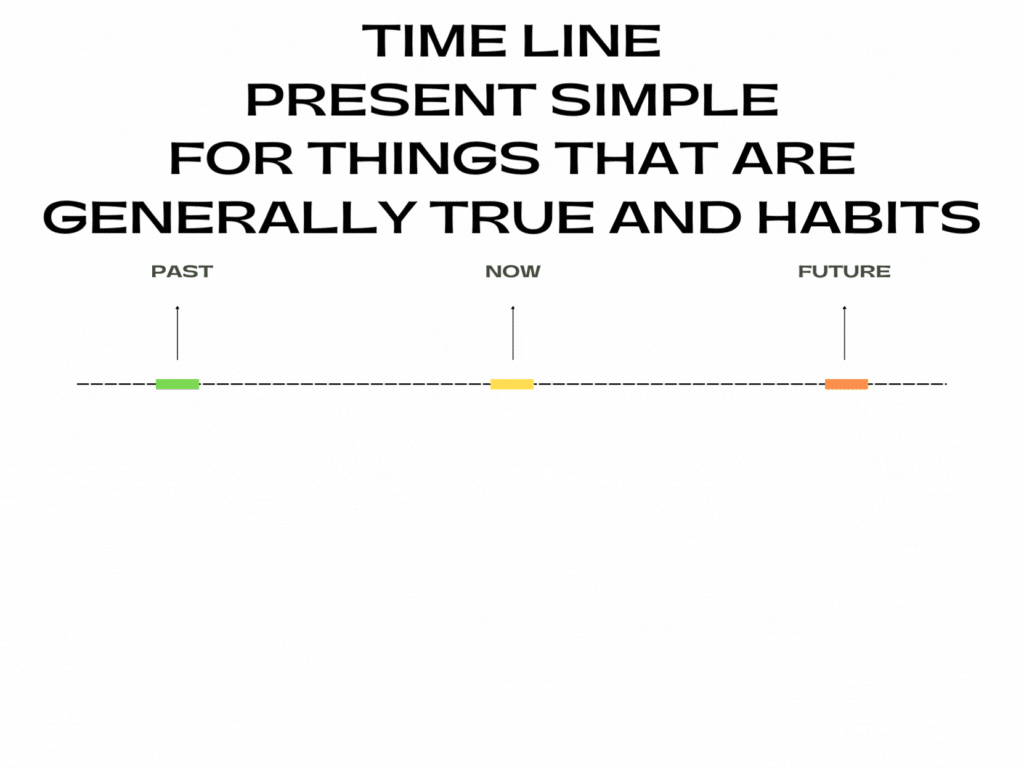Present Simple
For things that are generally true and habits

Table of Contents
Overview
In this grammar section we will have a look at the Present simple tense to talk about things that are generally true and habits.
The video gives an overview of the present simple for routines, habits and things that are generally true.
- It shows the form: how to construct the present simple positive, negative and question form and the exceptions. It also has a look at the placement of adverbs.
- It shows the meaning/usage: when and why to use the present simple
- It shows the pronunciation of the present simple: How you would pronounce different parts of the present simple.
Examples
Generally true
A: Do you work?
B: Yes, I am a doctor. I work in a hospital.
A: Do you have a brother?
B: No, I don’t have a brother
A: What is winter like?
B: It is always very cold and sometimes it snows.
Habits
A: What do you do in your free time?
B: I play computer games from time to time. I often read books. I spend a lot of time with my children. I also enjoy watching series. I don’t do a lot of sports.
A: How often do you go to a restaurant?
B: About once a month I go to a restaurant.
Usage/ Meaning
How and when do we use the present simple?

You use the present simple to talk about something that is generally true:
- I am a doctor. (always true)
- I don’t have a brother.(always true)
- It is always cold. (always true)
- It sometimes snows. (generally true)
You also use the present simple to talk about habits:
- From time to time I play computer games. (habit)
- I often read. (habit)
- I enjoy watching TV. (generally true/ habit)
- I don’t do a lot of sports. (habit/ generally true)
- About once a month I go to a restaurant. (habit)
Form
How do we make, form, construct the present simple?
Positive
Examples
- I work
- She plays computer games
Positive:
- I work
- You work
- she/he/it works
- You work
- They work
- We work
I/You/They/We Subject + infinitive (without to)
She/he/it + infinitive + s
Exceptions
- Final letter before Y is a consonant
- I study: She studies
- I worry: he worries
- y changes into ie
- Final letter before Y is a consonant
- Verbs ending in ch, sh, s, x or a, o
- I watch: He watches
- I finish: it finishes
- I go: she goes
- I do: she does
- +es instead of
s
Practice
Negative
Examples
- I don’t work
- We do not play computer games
- She doesn’t read books
- He does not speak English
Pronoun | Short form | Long form |
I | Don’t work | Do not work |
you | Don’t work | Do not work |
she/it/he | Doesn’t work | Does not work |
you | Don’t work | Do not work |
they | Don’t work | Do not work |
we | Don’t work | Do not work |
I/you/they/we don’t + infinitive (without to): don’t work
she/he/it + doesn’t + infinitive (without to): doesn’t work
Practice
Question
Examples
- Do you work?
- Does she work?
Do | Pronoun | Infinitive |
Do | I | work |
Do | you | work |
Does | she/it/he | work |
Do | you | work |
Do | they | work |
Do | we | work |
Do + I/you/they/we + infinitive (without to): Do you work?
Does + she/he/it + infinitive (without to): does she work?
NOT Does she works!
Practice
Short answer
- Yes, I do.
- Yes, she does
- Subject + do/does
- No, I don’t
- No, She doesn’t
- Subject + don’t/ doesn’t
Pronunciation
How do we pronounce different parts of the present simple?
With he/she/it the s has 3 different sounds : /s/, /z/ /iz/
When the last letter before the -s is non vibrating, the s sound is /s/
- She works
- She puts
- She surfs
When the last letter before the -s is vibrating, the s sound is /z/
- She plays
- She runs
- She spends
When the last letter before the -s is hissing sound (/ʧ/, /ʤ/, /ʃ/, /ʒ/, /z/, /s/), the s sound is /iz/
- She teaches
- She judges
- She finishes
- She messages
- She loses
- She misses
Time words
Which time words/expression/ adverbs are used with the present simple?
The simple past is often used with these time words
- Every day: I drink coffee every day.
- Always: She always comes late.
- Never: I never get up early.
- Once a week: I go swimming once a week.
- Twice a month: I visit my parents twice a month
- Usually: They usually arrive on time.
- From time to time: I ride a bike from time to time
- Often: We often take a taxi.
Questions
Have a look at the questions and write your answers in the comments below. Also give us some more details about when, where, why,….
- Do you play any sports?
- Do you like reading books?
- What is your favourite season?
- What do you usually have for breakfast?
- At what time do you usually get up in the morning?
- Do you have any brothers or sisters?
- What do you like about your teacher?
- How often do you eat out?
- When do you see your friends?
- How often do you go to the cinema?
Spread the word
Kristof Abrath
Teacher, Trainer, Course Designer
Teaching in English on 4 different continents since 2006.



